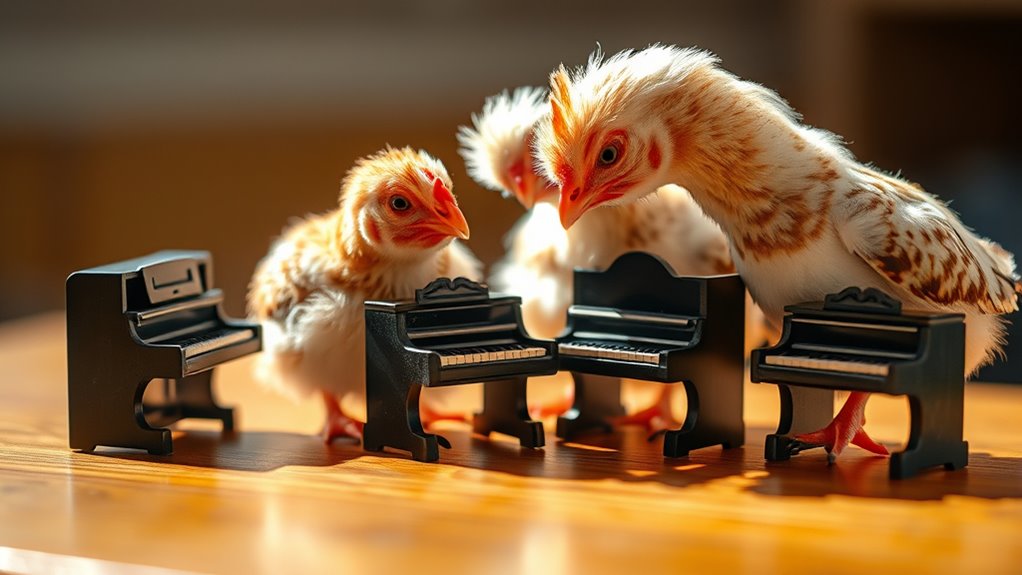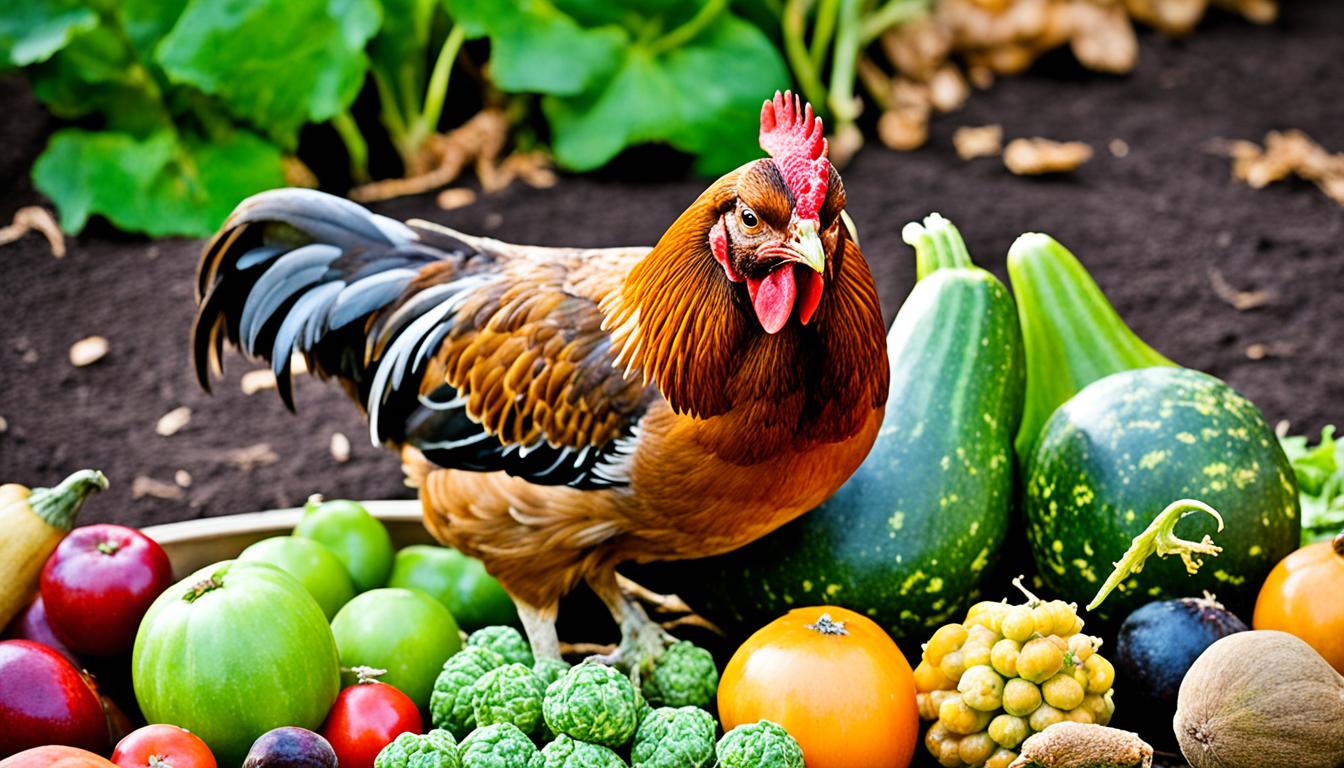Surprisingly, chickens can learn to play the piano through consistent training and positive reinforcement. They quickly pick up patterns, press keys in specific sequences, and even produce simple melodies, showing problem-solving skills and understanding of cause and effect. This behavior reveals their cognitive flexibility and ability to develop new, complex actions beyond instinct. If you want to discover more about these intelligent birds and their amazing peck‑formance, keep exploring their fascinating abilities.
Key Takeaways
- Chickens demonstrate surprising intelligence by learning to play simple melodies on a piano through training.
- Their quick grasp of patterns and sequences indicates strong memory and problem-solving abilities.
- Positive reinforcement and consistent practice enable chickens to develop complex behaviors beyond instinct.
- The experiment reveals chickens understand cause-and-effect relationships and can adapt new skills.
- These findings challenge traditional views of bird intelligence, showcasing their behavioral flexibility and cognitive potential.

In an astonishing breakthrough, chickens are now learning to play the piano, showcasing their surprising intelligence and adaptability. This development captures your attention because it challenges what you thought you knew about bird behavior. Usually, birds are associated with singing, but now, they’re demonstrating skills that resemble human musical training. You might wonder how these birds, with their limited dexterity, can manage such complex tasks. This experiment isn’t just about entertainment; it reveals that chickens can be trained to respond to stimuli and learn sequences, much like other animals with higher cognitive functions.
When you observe these chickens at work, you notice how quickly they pick up on patterns. Their ability to press keys in specific orders indicates that their learning process involves more than instinct; it involves memory and recognition. This isn’t accidental or purely instinctual. Instead, it’s a clear sign of behavioral flexibility, which you might not associate with poultry. Their persistence and focus during training sessions show that, with patience and proper reinforcement, chickens can develop new behaviors that seem almost human. You see them peck at the keys, sometimes with deliberate purpose, sometimes randomly, but gradually improving as they associate certain sounds with specific responses.
The process of musical training for these chickens involves consistent repetition and positive reinforcement. You’re likely impressed by how quickly they adapt to the cues you give, such as sounds or gestures, which signal when to peck. The training sessions are short but frequent, helping the birds form strong associations. Over time, they start to produce sequences that resemble simple melodies. Their behavior during these sessions reveals a willingness to learn and a capacity for problem-solving that you might not have expected from poultry. This kind of learning highlights that bird behavior is more complex and adaptable than traditional views suggest.
Additionally, this experiment underscores the importance of understanding animal cognition and behavioral flexibility, which can be applied in various fields including ethical hacking, where problem-solving and adaptability are crucial. Watching these chickens, you realize that their success in playing the piano isn’t just about mimicking sounds. It’s about their ability to understand cause and effect, follow patterns, and persist through frustration. The experiment proves that with the right kind of musical training, even creatures you see as simple farm animals can display remarkable cognitive abilities. This challenges your assumptions and encourages you to see birds not just as instinct-driven creatures, but as learners capable of acquiring new skills. Their peck-performance on the piano is a testament to their intelligence, adaptability, and the fascinating complexity of bird behavior.
Frequently Asked Questions
How Long Did It Take Chickens to Learn to Play Piano?
You’re curious how long it takes chickens to learn to play piano, right? Well, based on research into chicken cognition and their response to musical training, it varies. Some chickens pick up simple tunes after a few weeks, while others need months of consistent practice. Their natural curiosity and ability to learn through repetition help, but individual differences also play a role, making the exact time quite variable.
What Breeds of Chickens Were Used in the Experiment?
You might wonder which chicken breeds participated in the experiment. The researchers used specific chicken breeds known for their intelligence and trainability, such as Silkies and Leghorns. These breeds have unique breed characteristics—Silkies are friendly and curious, while Leghorns are active and alert. By selecting these breeds, the experiment aimed to see how different breed characteristics influence a chicken’s ability to learn piano-playing skills.
Can Chickens Play Other Musical Instruments Besides the Piano?
Imagine watching chickens peck at different instruments; it’s fascinating! While avian cognition shows they can learn simple tasks, their ability for musical training beyond the piano remains limited. Chickens might peck at drums or xylophones, but mastering complex instruments like guitars or violins is unlikely. Their cognitive skills support basic sound recognition, but playing intricate instruments isn’t within their natural capabilities. So, they’re best suited for simple musical experiments.
How Do Chickens Perceive Music and Sound?
You might wonder how chickens perceive music and sound. Their avian cognition allows them to process various sounds, but their sound perception differs from humans. Chickens can recognize specific calls and respond accordingly, showing they are sensitive to pitch and rhythm. Although they don’t experience music the same way we do, their ability to distinguish sounds highlights their unique auditory perception, which is essential for communication and survival.
Are There Benefits to Chickens From Learning to Play Piano?
You might wonder if chickens gain anything from learning to play piano. Engaging in musical enrichment can boost their chicken cognition, helping them develop problem-solving skills and reduce stress. Playing music stimulates their minds and encourages natural behaviors, leading to a happier, healthier environment. So, yes, teaching chickens to play piano offers benefits like mental stimulation and emotional well-being, making it a worthwhile activity for their overall welfare.
Conclusion
Imagine watching a chicken confidently peck out a tune on the piano, just like in a fascinating case study where a hen named Penny learned to play simple melodies. This shows that chickens can surprise us with their learning abilities, breaking stereotypes about what animals can do. So next time you see a bird, remember, they might just have a hidden talent waiting to be discovered. Who knows what other surprises nature has in store?









